Report: Entrepreneurship in Travel and Tourism Industry Analysis
VerifiedAdded on 2020/06/03
|12
|3726
|157
Report
AI Summary
This report delves into the realm of travel and tourism entrepreneurship, examining the essential skills and traits required for success in this dynamic industry. It begins by identifying the core competencies of a successful entrepreneur, including self-confidence, passion, time management, and self-motivation, and it provides a self-assessment of these traits. The report then analyzes the development strategies of entrepreneurial enterprises within the tourism sector, emphasizing factors crucial for effective leadership, such as market orientation and innovation. Furthermore, it evaluates various sources of finance and support available to entrepreneurs, exploring the potential for success of a business concept and providing insights into crafting a persuasive business start-up plan. Overall, the report offers a comprehensive overview of the key elements involved in establishing and managing a thriving travel and tourism enterprise.
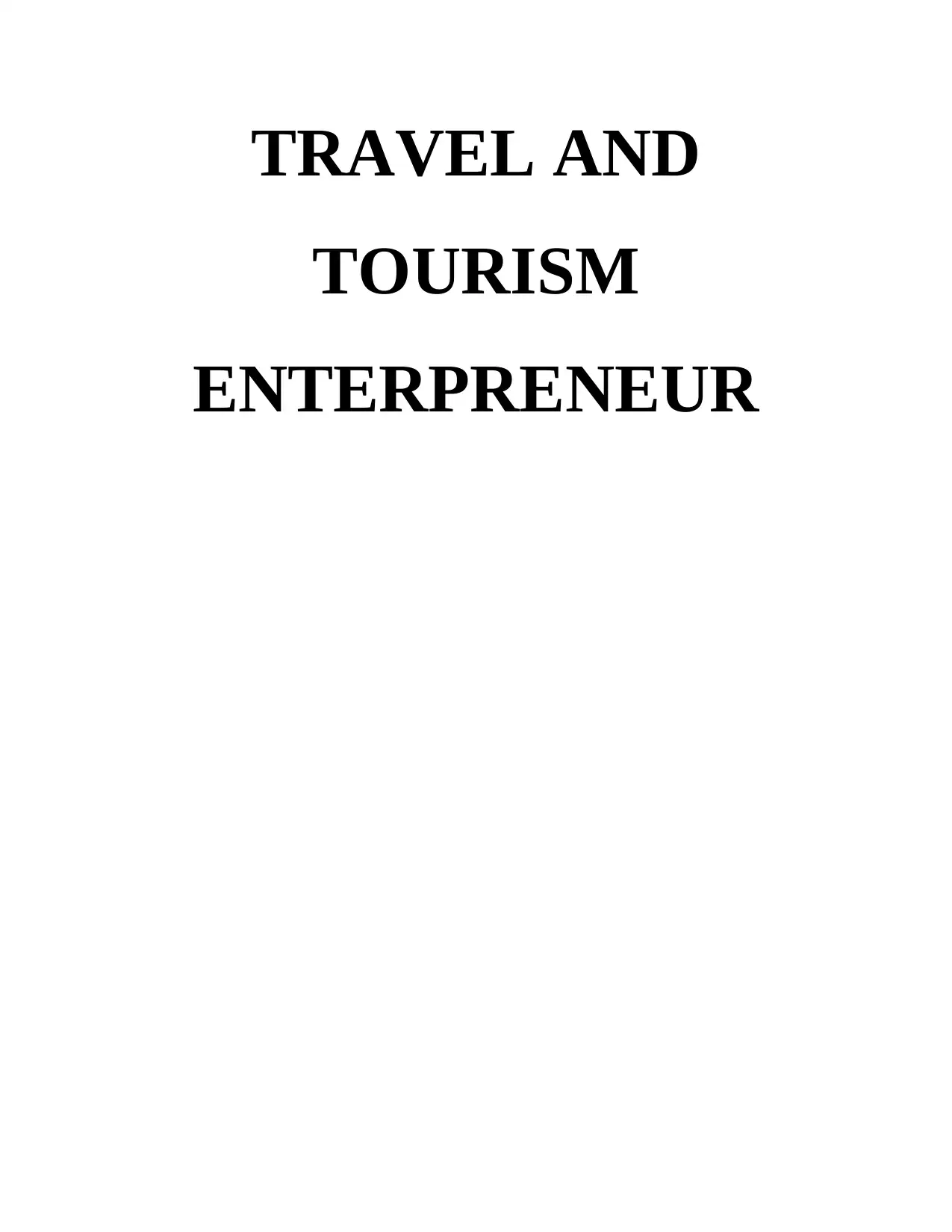
TRAVEL AND
TOURISM
ENTERPRENEUR
TOURISM
ENTERPRENEUR
Paraphrase This Document
Need a fresh take? Get an instant paraphrase of this document with our AI Paraphraser
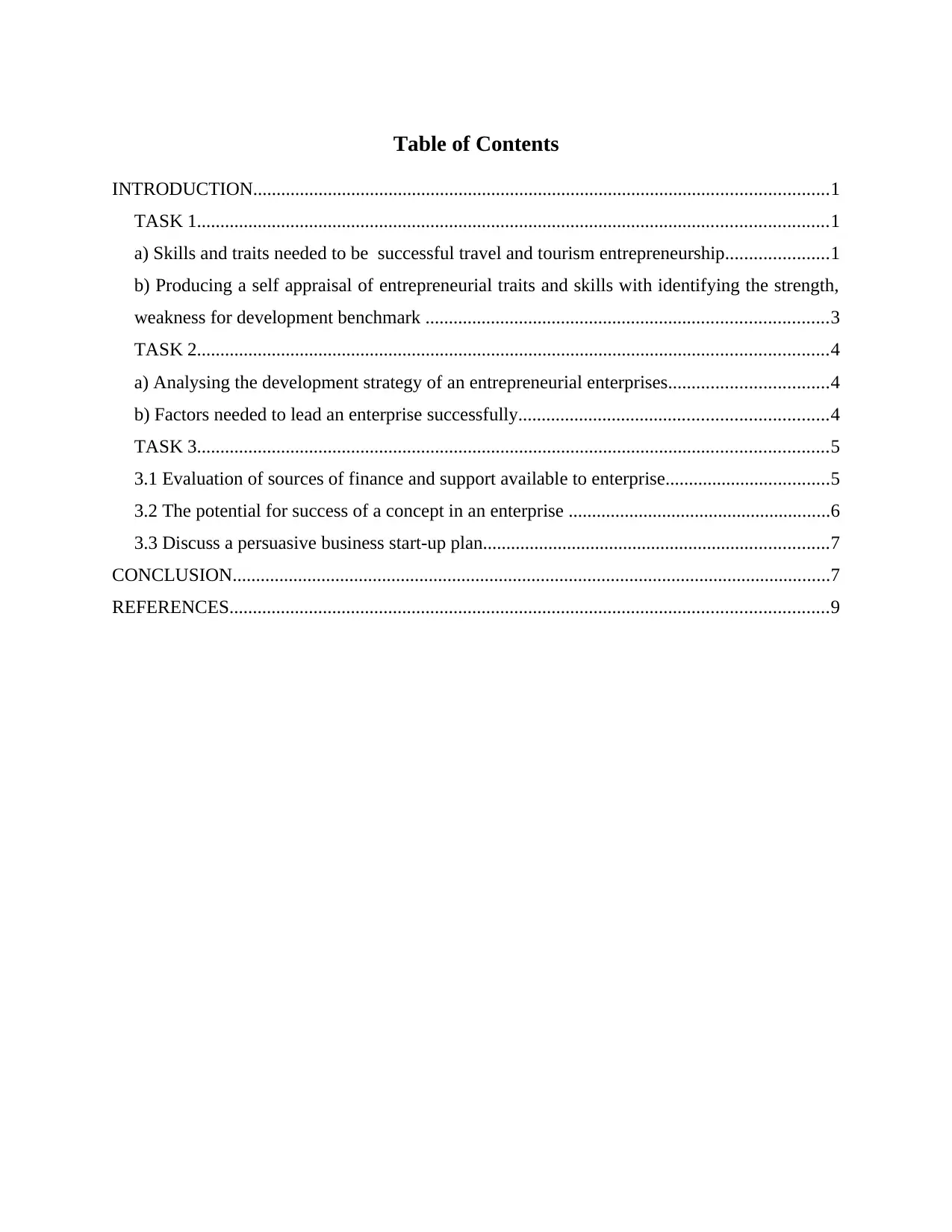
Table of Contents
INTRODUCTION...........................................................................................................................1
TASK 1.......................................................................................................................................1
a) Skills and traits needed to be successful travel and tourism entrepreneurship......................1
b) Producing a self appraisal of entrepreneurial traits and skills with identifying the strength,
weakness for development benchmark ......................................................................................3
TASK 2.......................................................................................................................................4
a) Analysing the development strategy of an entrepreneurial enterprises..................................4
b) Factors needed to lead an enterprise successfully..................................................................4
TASK 3.......................................................................................................................................5
3.1 Evaluation of sources of finance and support available to enterprise...................................5
3.2 The potential for success of a concept in an enterprise ........................................................6
3.3 Discuss a persuasive business start-up plan..........................................................................7
CONCLUSION................................................................................................................................7
REFERENCES................................................................................................................................9
INTRODUCTION...........................................................................................................................1
TASK 1.......................................................................................................................................1
a) Skills and traits needed to be successful travel and tourism entrepreneurship......................1
b) Producing a self appraisal of entrepreneurial traits and skills with identifying the strength,
weakness for development benchmark ......................................................................................3
TASK 2.......................................................................................................................................4
a) Analysing the development strategy of an entrepreneurial enterprises..................................4
b) Factors needed to lead an enterprise successfully..................................................................4
TASK 3.......................................................................................................................................5
3.1 Evaluation of sources of finance and support available to enterprise...................................5
3.2 The potential for success of a concept in an enterprise ........................................................6
3.3 Discuss a persuasive business start-up plan..........................................................................7
CONCLUSION................................................................................................................................7
REFERENCES................................................................................................................................9

⊘ This is a preview!⊘
Do you want full access?
Subscribe today to unlock all pages.

Trusted by 1+ million students worldwide
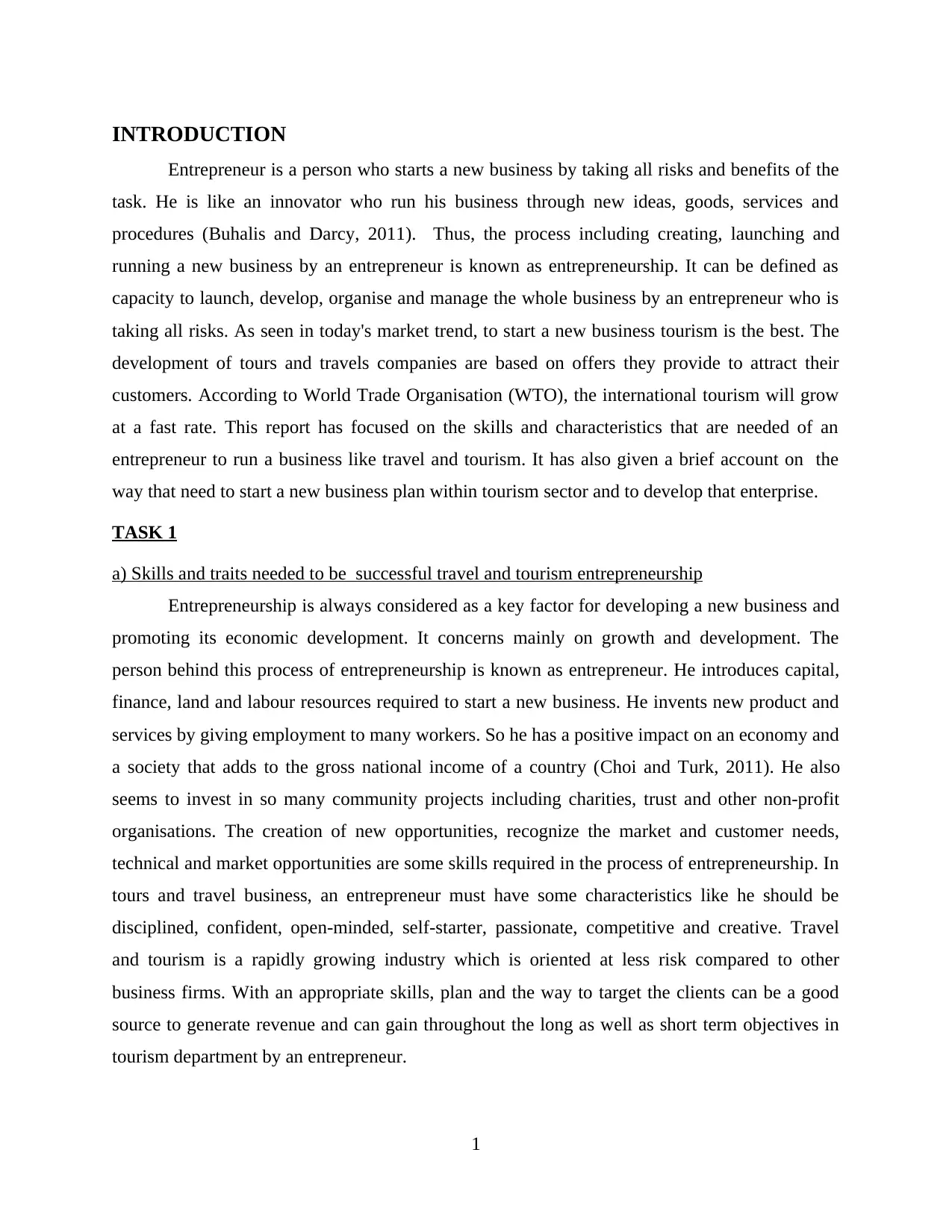
INTRODUCTION
Entrepreneur is a person who starts a new business by taking all risks and benefits of the
task. He is like an innovator who run his business through new ideas, goods, services and
procedures (Buhalis and Darcy, 2011). Thus, the process including creating, launching and
running a new business by an entrepreneur is known as entrepreneurship. It can be defined as
capacity to launch, develop, organise and manage the whole business by an entrepreneur who is
taking all risks. As seen in today's market trend, to start a new business tourism is the best. The
development of tours and travels companies are based on offers they provide to attract their
customers. According to World Trade Organisation (WTO), the international tourism will grow
at a fast rate. This report has focused on the skills and characteristics that are needed of an
entrepreneur to run a business like travel and tourism. It has also given a brief account on the
way that need to start a new business plan within tourism sector and to develop that enterprise.
TASK 1
a) Skills and traits needed to be successful travel and tourism entrepreneurship
Entrepreneurship is always considered as a key factor for developing a new business and
promoting its economic development. It concerns mainly on growth and development. The
person behind this process of entrepreneurship is known as entrepreneur. He introduces capital,
finance, land and labour resources required to start a new business. He invents new product and
services by giving employment to many workers. So he has a positive impact on an economy and
a society that adds to the gross national income of a country (Choi and Turk, 2011). He also
seems to invest in so many community projects including charities, trust and other non-profit
organisations. The creation of new opportunities, recognize the market and customer needs,
technical and market opportunities are some skills required in the process of entrepreneurship. In
tours and travel business, an entrepreneur must have some characteristics like he should be
disciplined, confident, open-minded, self-starter, passionate, competitive and creative. Travel
and tourism is a rapidly growing industry which is oriented at less risk compared to other
business firms. With an appropriate skills, plan and the way to target the clients can be a good
source to generate revenue and can gain throughout the long as well as short term objectives in
tourism department by an entrepreneur.
1
Entrepreneur is a person who starts a new business by taking all risks and benefits of the
task. He is like an innovator who run his business through new ideas, goods, services and
procedures (Buhalis and Darcy, 2011). Thus, the process including creating, launching and
running a new business by an entrepreneur is known as entrepreneurship. It can be defined as
capacity to launch, develop, organise and manage the whole business by an entrepreneur who is
taking all risks. As seen in today's market trend, to start a new business tourism is the best. The
development of tours and travels companies are based on offers they provide to attract their
customers. According to World Trade Organisation (WTO), the international tourism will grow
at a fast rate. This report has focused on the skills and characteristics that are needed of an
entrepreneur to run a business like travel and tourism. It has also given a brief account on the
way that need to start a new business plan within tourism sector and to develop that enterprise.
TASK 1
a) Skills and traits needed to be successful travel and tourism entrepreneurship
Entrepreneurship is always considered as a key factor for developing a new business and
promoting its economic development. It concerns mainly on growth and development. The
person behind this process of entrepreneurship is known as entrepreneur. He introduces capital,
finance, land and labour resources required to start a new business. He invents new product and
services by giving employment to many workers. So he has a positive impact on an economy and
a society that adds to the gross national income of a country (Choi and Turk, 2011). He also
seems to invest in so many community projects including charities, trust and other non-profit
organisations. The creation of new opportunities, recognize the market and customer needs,
technical and market opportunities are some skills required in the process of entrepreneurship. In
tours and travel business, an entrepreneur must have some characteristics like he should be
disciplined, confident, open-minded, self-starter, passionate, competitive and creative. Travel
and tourism is a rapidly growing industry which is oriented at less risk compared to other
business firms. With an appropriate skills, plan and the way to target the clients can be a good
source to generate revenue and can gain throughout the long as well as short term objectives in
tourism department by an entrepreneur.
1
Paraphrase This Document
Need a fresh take? Get an instant paraphrase of this document with our AI Paraphraser
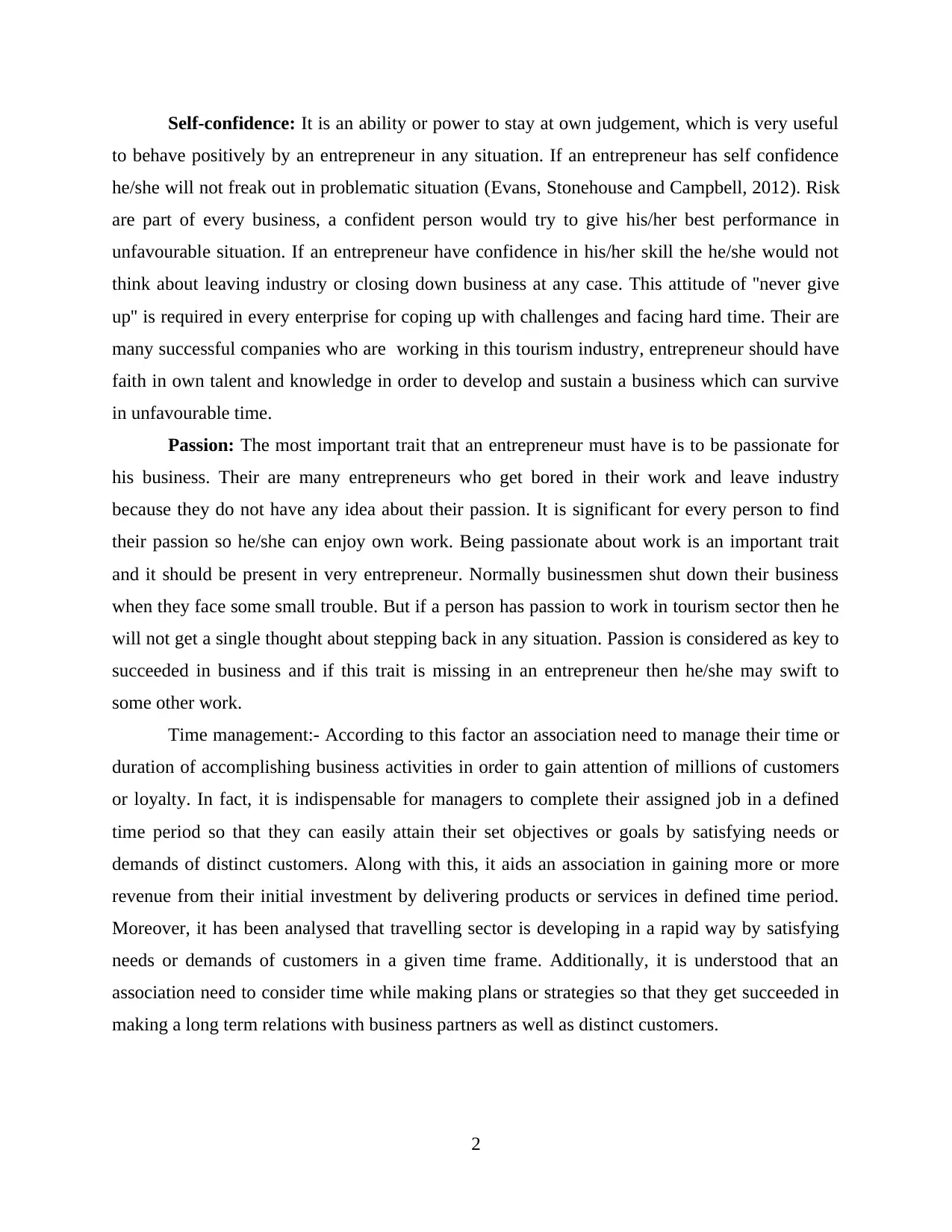
Self-confidence: It is an ability or power to stay at own judgement, which is very useful
to behave positively by an entrepreneur in any situation. If an entrepreneur has self confidence
he/she will not freak out in problematic situation (Evans, Stonehouse and Campbell, 2012). Risk
are part of every business, a confident person would try to give his/her best performance in
unfavourable situation. If an entrepreneur have confidence in his/her skill the he/she would not
think about leaving industry or closing down business at any case. This attitude of ''never give
up'' is required in every enterprise for coping up with challenges and facing hard time. Their are
many successful companies who are working in this tourism industry, entrepreneur should have
faith in own talent and knowledge in order to develop and sustain a business which can survive
in unfavourable time.
Passion: The most important trait that an entrepreneur must have is to be passionate for
his business. Their are many entrepreneurs who get bored in their work and leave industry
because they do not have any idea about their passion. It is significant for every person to find
their passion so he/she can enjoy own work. Being passionate about work is an important trait
and it should be present in very entrepreneur. Normally businessmen shut down their business
when they face some small trouble. But if a person has passion to work in tourism sector then he
will not get a single thought about stepping back in any situation. Passion is considered as key to
succeeded in business and if this trait is missing in an entrepreneur then he/she may swift to
some other work.
Time management:- According to this factor an association need to manage their time or
duration of accomplishing business activities in order to gain attention of millions of customers
or loyalty. In fact, it is indispensable for managers to complete their assigned job in a defined
time period so that they can easily attain their set objectives or goals by satisfying needs or
demands of distinct customers. Along with this, it aids an association in gaining more or more
revenue from their initial investment by delivering products or services in defined time period.
Moreover, it has been analysed that travelling sector is developing in a rapid way by satisfying
needs or demands of customers in a given time frame. Additionally, it is understood that an
association need to consider time while making plans or strategies so that they get succeeded in
making a long term relations with business partners as well as distinct customers.
2
to behave positively by an entrepreneur in any situation. If an entrepreneur has self confidence
he/she will not freak out in problematic situation (Evans, Stonehouse and Campbell, 2012). Risk
are part of every business, a confident person would try to give his/her best performance in
unfavourable situation. If an entrepreneur have confidence in his/her skill the he/she would not
think about leaving industry or closing down business at any case. This attitude of ''never give
up'' is required in every enterprise for coping up with challenges and facing hard time. Their are
many successful companies who are working in this tourism industry, entrepreneur should have
faith in own talent and knowledge in order to develop and sustain a business which can survive
in unfavourable time.
Passion: The most important trait that an entrepreneur must have is to be passionate for
his business. Their are many entrepreneurs who get bored in their work and leave industry
because they do not have any idea about their passion. It is significant for every person to find
their passion so he/she can enjoy own work. Being passionate about work is an important trait
and it should be present in very entrepreneur. Normally businessmen shut down their business
when they face some small trouble. But if a person has passion to work in tourism sector then he
will not get a single thought about stepping back in any situation. Passion is considered as key to
succeeded in business and if this trait is missing in an entrepreneur then he/she may swift to
some other work.
Time management:- According to this factor an association need to manage their time or
duration of accomplishing business activities in order to gain attention of millions of customers
or loyalty. In fact, it is indispensable for managers to complete their assigned job in a defined
time period so that they can easily attain their set objectives or goals by satisfying needs or
demands of distinct customers. Along with this, it aids an association in gaining more or more
revenue from their initial investment by delivering products or services in defined time period.
Moreover, it has been analysed that travelling sector is developing in a rapid way by satisfying
needs or demands of customers in a given time frame. Additionally, it is understood that an
association need to consider time while making plans or strategies so that they get succeeded in
making a long term relations with business partners as well as distinct customers.
2
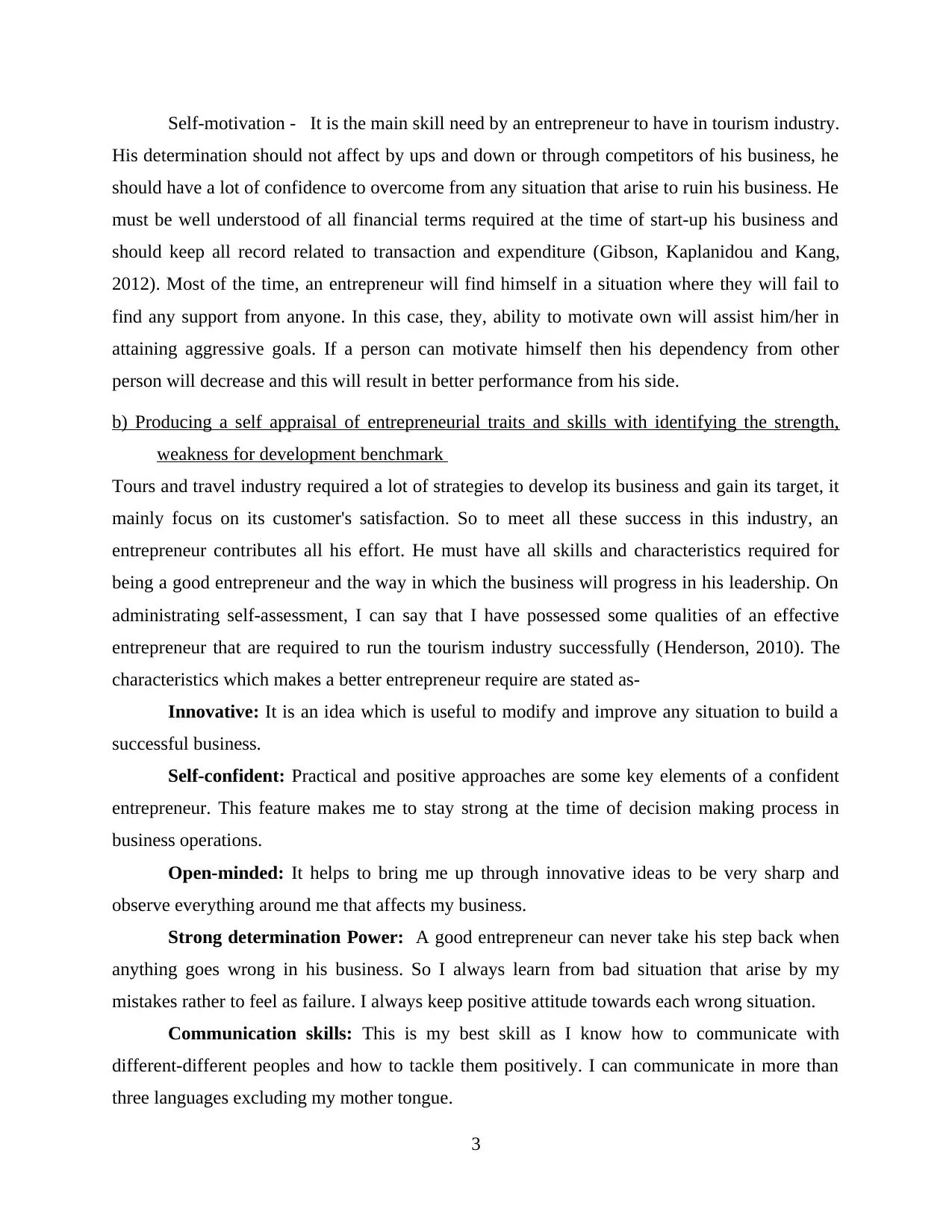
Self-motivation - It is the main skill need by an entrepreneur to have in tourism industry.
His determination should not affect by ups and down or through competitors of his business, he
should have a lot of confidence to overcome from any situation that arise to ruin his business. He
must be well understood of all financial terms required at the time of start-up his business and
should keep all record related to transaction and expenditure (Gibson, Kaplanidou and Kang,
2012). Most of the time, an entrepreneur will find himself in a situation where they will fail to
find any support from anyone. In this case, they, ability to motivate own will assist him/her in
attaining aggressive goals. If a person can motivate himself then his dependency from other
person will decrease and this will result in better performance from his side.
b) Producing a self appraisal of entrepreneurial traits and skills with identifying the strength,
weakness for development benchmark
Tours and travel industry required a lot of strategies to develop its business and gain its target, it
mainly focus on its customer's satisfaction. So to meet all these success in this industry, an
entrepreneur contributes all his effort. He must have all skills and characteristics required for
being a good entrepreneur and the way in which the business will progress in his leadership. On
administrating self-assessment, I can say that I have possessed some qualities of an effective
entrepreneur that are required to run the tourism industry successfully (Henderson, 2010). The
characteristics which makes a better entrepreneur require are stated as-
Innovative: It is an idea which is useful to modify and improve any situation to build a
successful business.
Self-confident: Practical and positive approaches are some key elements of a confident
entrepreneur. This feature makes me to stay strong at the time of decision making process in
business operations.
Open-minded: It helps to bring me up through innovative ideas to be very sharp and
observe everything around me that affects my business.
Strong determination Power: A good entrepreneur can never take his step back when
anything goes wrong in his business. So I always learn from bad situation that arise by my
mistakes rather to feel as failure. I always keep positive attitude towards each wrong situation.
Communication skills: This is my best skill as I know how to communicate with
different-different peoples and how to tackle them positively. I can communicate in more than
three languages excluding my mother tongue.
3
His determination should not affect by ups and down or through competitors of his business, he
should have a lot of confidence to overcome from any situation that arise to ruin his business. He
must be well understood of all financial terms required at the time of start-up his business and
should keep all record related to transaction and expenditure (Gibson, Kaplanidou and Kang,
2012). Most of the time, an entrepreneur will find himself in a situation where they will fail to
find any support from anyone. In this case, they, ability to motivate own will assist him/her in
attaining aggressive goals. If a person can motivate himself then his dependency from other
person will decrease and this will result in better performance from his side.
b) Producing a self appraisal of entrepreneurial traits and skills with identifying the strength,
weakness for development benchmark
Tours and travel industry required a lot of strategies to develop its business and gain its target, it
mainly focus on its customer's satisfaction. So to meet all these success in this industry, an
entrepreneur contributes all his effort. He must have all skills and characteristics required for
being a good entrepreneur and the way in which the business will progress in his leadership. On
administrating self-assessment, I can say that I have possessed some qualities of an effective
entrepreneur that are required to run the tourism industry successfully (Henderson, 2010). The
characteristics which makes a better entrepreneur require are stated as-
Innovative: It is an idea which is useful to modify and improve any situation to build a
successful business.
Self-confident: Practical and positive approaches are some key elements of a confident
entrepreneur. This feature makes me to stay strong at the time of decision making process in
business operations.
Open-minded: It helps to bring me up through innovative ideas to be very sharp and
observe everything around me that affects my business.
Strong determination Power: A good entrepreneur can never take his step back when
anything goes wrong in his business. So I always learn from bad situation that arise by my
mistakes rather to feel as failure. I always keep positive attitude towards each wrong situation.
Communication skills: This is my best skill as I know how to communicate with
different-different peoples and how to tackle them positively. I can communicate in more than
three languages excluding my mother tongue.
3
⊘ This is a preview!⊘
Do you want full access?
Subscribe today to unlock all pages.

Trusted by 1+ million students worldwide
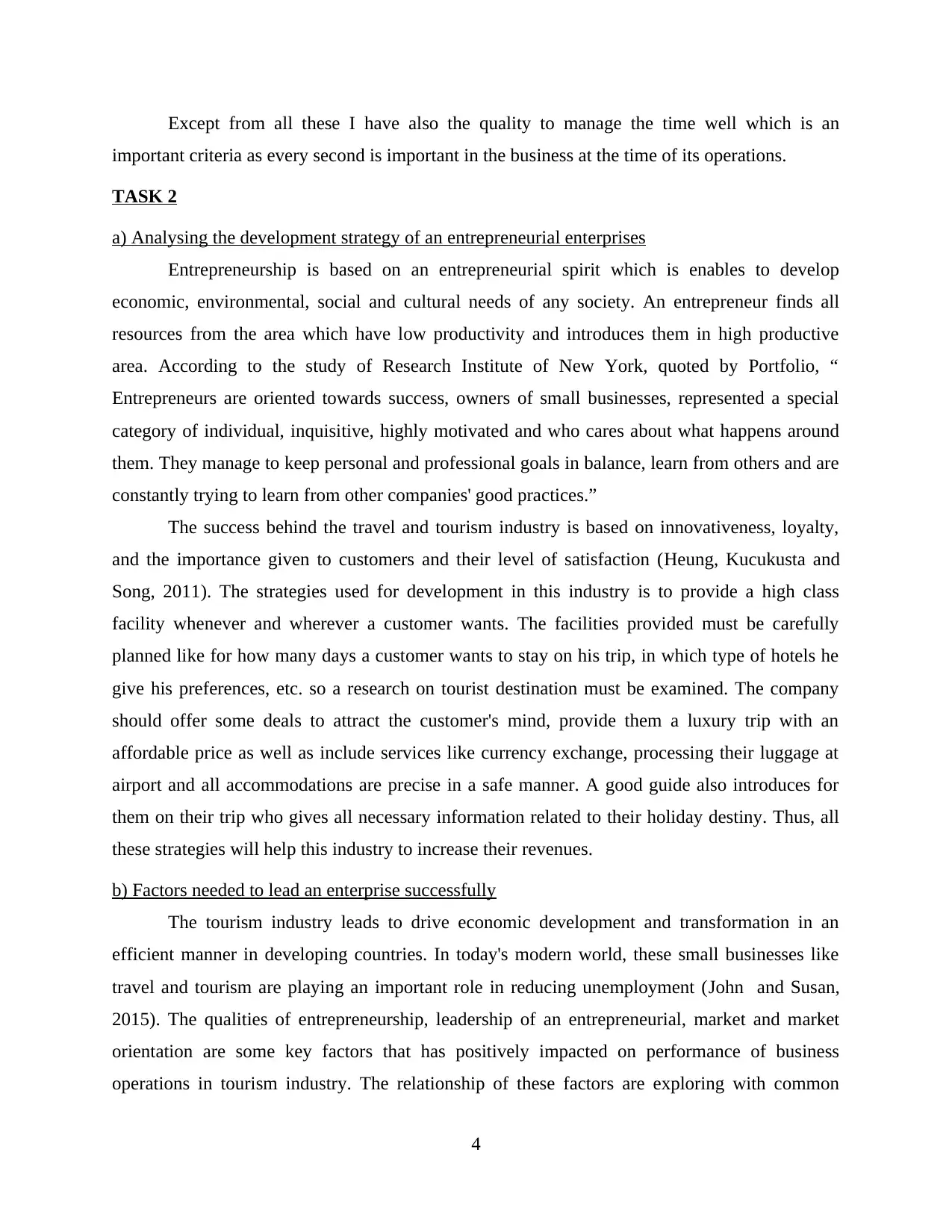
Except from all these I have also the quality to manage the time well which is an
important criteria as every second is important in the business at the time of its operations.
TASK 2
a) Analysing the development strategy of an entrepreneurial enterprises
Entrepreneurship is based on an entrepreneurial spirit which is enables to develop
economic, environmental, social and cultural needs of any society. An entrepreneur finds all
resources from the area which have low productivity and introduces them in high productive
area. According to the study of Research Institute of New York, quoted by Portfolio, “
Entrepreneurs are oriented towards success, owners of small businesses, represented a special
category of individual, inquisitive, highly motivated and who cares about what happens around
them. They manage to keep personal and professional goals in balance, learn from others and are
constantly trying to learn from other companies' good practices.”
The success behind the travel and tourism industry is based on innovativeness, loyalty,
and the importance given to customers and their level of satisfaction (Heung, Kucukusta and
Song, 2011). The strategies used for development in this industry is to provide a high class
facility whenever and wherever a customer wants. The facilities provided must be carefully
planned like for how many days a customer wants to stay on his trip, in which type of hotels he
give his preferences, etc. so a research on tourist destination must be examined. The company
should offer some deals to attract the customer's mind, provide them a luxury trip with an
affordable price as well as include services like currency exchange, processing their luggage at
airport and all accommodations are precise in a safe manner. A good guide also introduces for
them on their trip who gives all necessary information related to their holiday destiny. Thus, all
these strategies will help this industry to increase their revenues.
b) Factors needed to lead an enterprise successfully
The tourism industry leads to drive economic development and transformation in an
efficient manner in developing countries. In today's modern world, these small businesses like
travel and tourism are playing an important role in reducing unemployment (John and Susan,
2015). The qualities of entrepreneurship, leadership of an entrepreneurial, market and market
orientation are some key factors that has positively impacted on performance of business
operations in tourism industry. The relationship of these factors are exploring with common
4
important criteria as every second is important in the business at the time of its operations.
TASK 2
a) Analysing the development strategy of an entrepreneurial enterprises
Entrepreneurship is based on an entrepreneurial spirit which is enables to develop
economic, environmental, social and cultural needs of any society. An entrepreneur finds all
resources from the area which have low productivity and introduces them in high productive
area. According to the study of Research Institute of New York, quoted by Portfolio, “
Entrepreneurs are oriented towards success, owners of small businesses, represented a special
category of individual, inquisitive, highly motivated and who cares about what happens around
them. They manage to keep personal and professional goals in balance, learn from others and are
constantly trying to learn from other companies' good practices.”
The success behind the travel and tourism industry is based on innovativeness, loyalty,
and the importance given to customers and their level of satisfaction (Heung, Kucukusta and
Song, 2011). The strategies used for development in this industry is to provide a high class
facility whenever and wherever a customer wants. The facilities provided must be carefully
planned like for how many days a customer wants to stay on his trip, in which type of hotels he
give his preferences, etc. so a research on tourist destination must be examined. The company
should offer some deals to attract the customer's mind, provide them a luxury trip with an
affordable price as well as include services like currency exchange, processing their luggage at
airport and all accommodations are precise in a safe manner. A good guide also introduces for
them on their trip who gives all necessary information related to their holiday destiny. Thus, all
these strategies will help this industry to increase their revenues.
b) Factors needed to lead an enterprise successfully
The tourism industry leads to drive economic development and transformation in an
efficient manner in developing countries. In today's modern world, these small businesses like
travel and tourism are playing an important role in reducing unemployment (John and Susan,
2015). The qualities of entrepreneurship, leadership of an entrepreneurial, market and market
orientation are some key factors that has positively impacted on performance of business
operations in tourism industry. The relationship of these factors are exploring with common
4
Paraphrase This Document
Need a fresh take? Get an instant paraphrase of this document with our AI Paraphraser
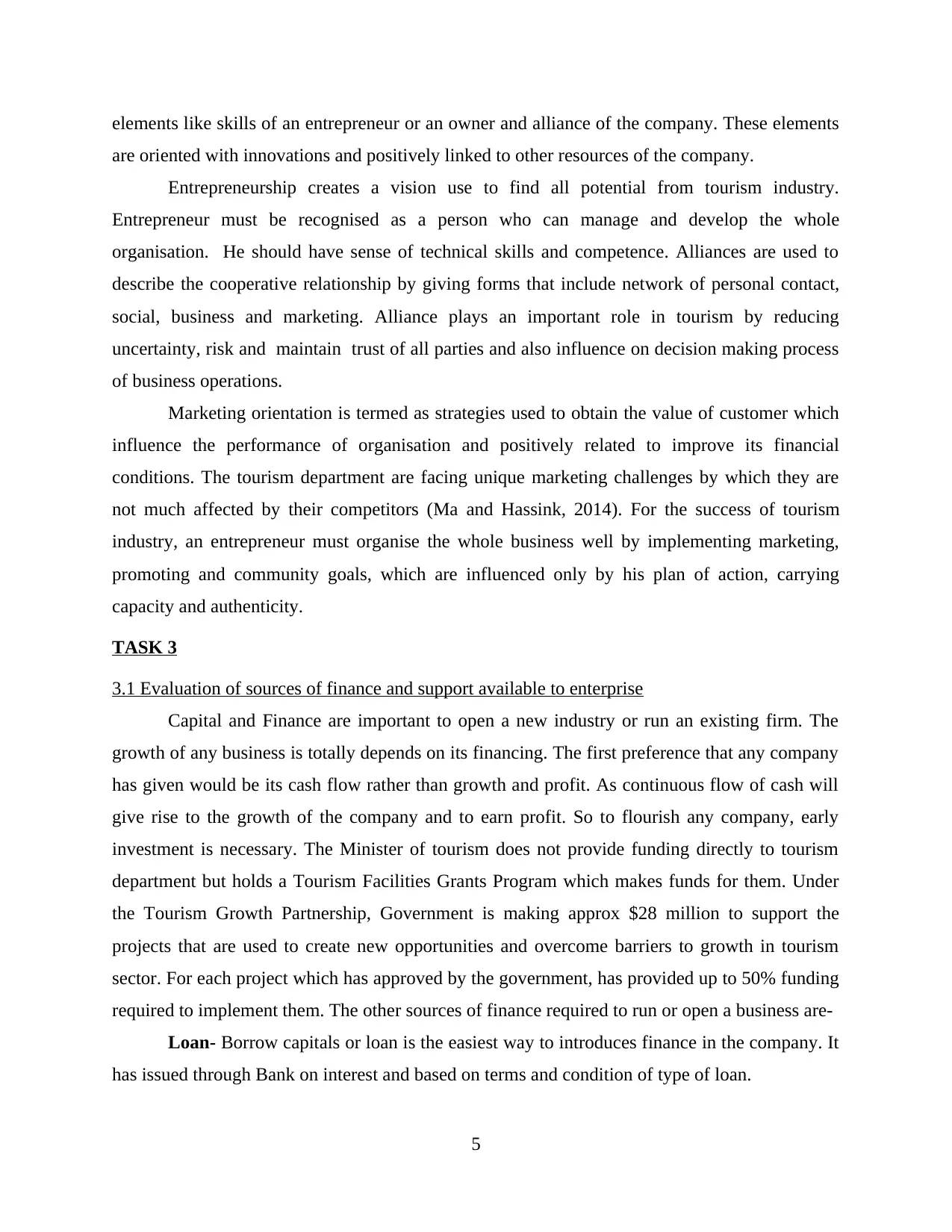
elements like skills of an entrepreneur or an owner and alliance of the company. These elements
are oriented with innovations and positively linked to other resources of the company.
Entrepreneurship creates a vision use to find all potential from tourism industry.
Entrepreneur must be recognised as a person who can manage and develop the whole
organisation. He should have sense of technical skills and competence. Alliances are used to
describe the cooperative relationship by giving forms that include network of personal contact,
social, business and marketing. Alliance plays an important role in tourism by reducing
uncertainty, risk and maintain trust of all parties and also influence on decision making process
of business operations.
Marketing orientation is termed as strategies used to obtain the value of customer which
influence the performance of organisation and positively related to improve its financial
conditions. The tourism department are facing unique marketing challenges by which they are
not much affected by their competitors (Ma and Hassink, 2014). For the success of tourism
industry, an entrepreneur must organise the whole business well by implementing marketing,
promoting and community goals, which are influenced only by his plan of action, carrying
capacity and authenticity.
TASK 3
3.1 Evaluation of sources of finance and support available to enterprise
Capital and Finance are important to open a new industry or run an existing firm. The
growth of any business is totally depends on its financing. The first preference that any company
has given would be its cash flow rather than growth and profit. As continuous flow of cash will
give rise to the growth of the company and to earn profit. So to flourish any company, early
investment is necessary. The Minister of tourism does not provide funding directly to tourism
department but holds a Tourism Facilities Grants Program which makes funds for them. Under
the Tourism Growth Partnership, Government is making approx $28 million to support the
projects that are used to create new opportunities and overcome barriers to growth in tourism
sector. For each project which has approved by the government, has provided up to 50% funding
required to implement them. The other sources of finance required to run or open a business are-
Loan- Borrow capitals or loan is the easiest way to introduces finance in the company. It
has issued through Bank on interest and based on terms and condition of type of loan.
5
are oriented with innovations and positively linked to other resources of the company.
Entrepreneurship creates a vision use to find all potential from tourism industry.
Entrepreneur must be recognised as a person who can manage and develop the whole
organisation. He should have sense of technical skills and competence. Alliances are used to
describe the cooperative relationship by giving forms that include network of personal contact,
social, business and marketing. Alliance plays an important role in tourism by reducing
uncertainty, risk and maintain trust of all parties and also influence on decision making process
of business operations.
Marketing orientation is termed as strategies used to obtain the value of customer which
influence the performance of organisation and positively related to improve its financial
conditions. The tourism department are facing unique marketing challenges by which they are
not much affected by their competitors (Ma and Hassink, 2014). For the success of tourism
industry, an entrepreneur must organise the whole business well by implementing marketing,
promoting and community goals, which are influenced only by his plan of action, carrying
capacity and authenticity.
TASK 3
3.1 Evaluation of sources of finance and support available to enterprise
Capital and Finance are important to open a new industry or run an existing firm. The
growth of any business is totally depends on its financing. The first preference that any company
has given would be its cash flow rather than growth and profit. As continuous flow of cash will
give rise to the growth of the company and to earn profit. So to flourish any company, early
investment is necessary. The Minister of tourism does not provide funding directly to tourism
department but holds a Tourism Facilities Grants Program which makes funds for them. Under
the Tourism Growth Partnership, Government is making approx $28 million to support the
projects that are used to create new opportunities and overcome barriers to growth in tourism
sector. For each project which has approved by the government, has provided up to 50% funding
required to implement them. The other sources of finance required to run or open a business are-
Loan- Borrow capitals or loan is the easiest way to introduces finance in the company. It
has issued through Bank on interest and based on terms and condition of type of loan.
5
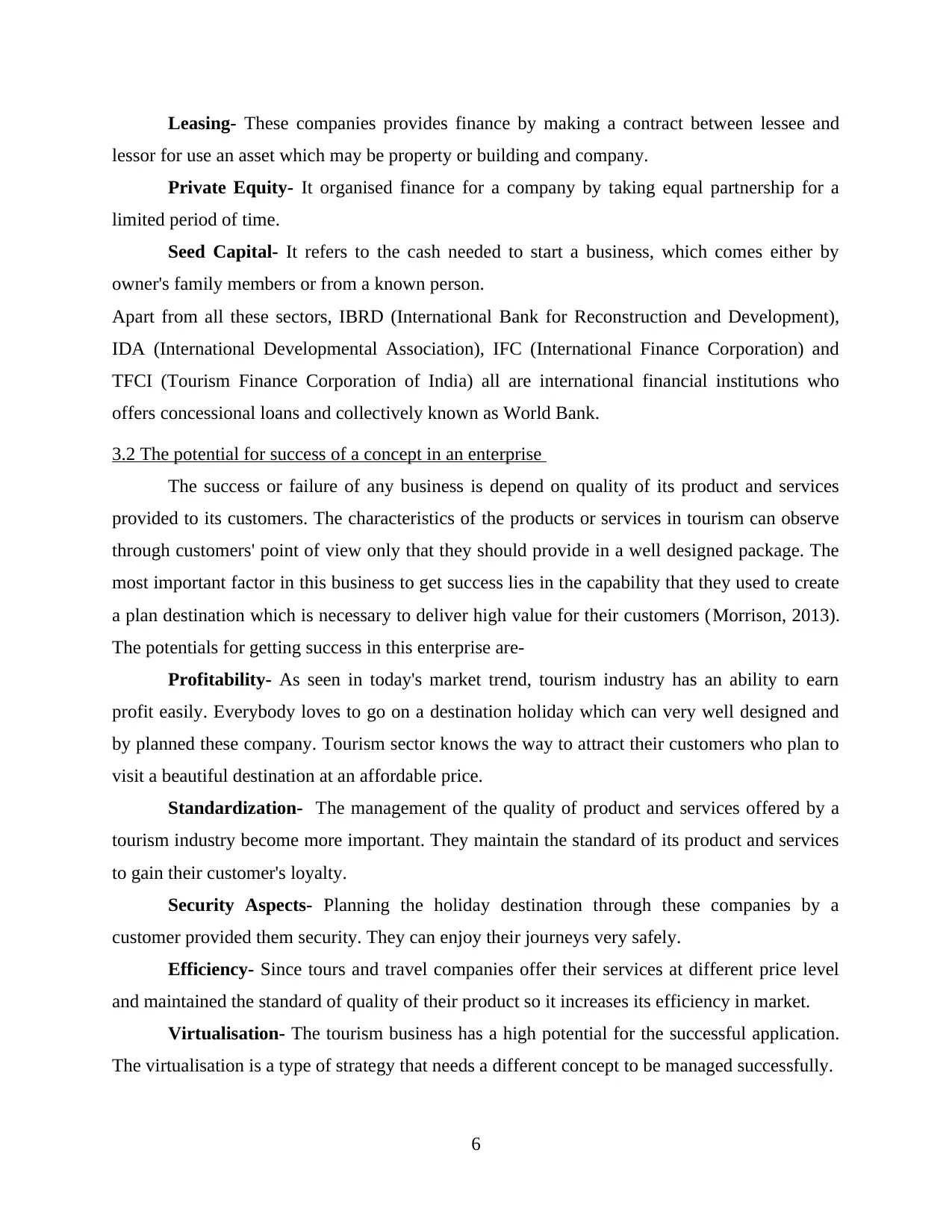
Leasing- These companies provides finance by making a contract between lessee and
lessor for use an asset which may be property or building and company.
Private Equity- It organised finance for a company by taking equal partnership for a
limited period of time.
Seed Capital- It refers to the cash needed to start a business, which comes either by
owner's family members or from a known person.
Apart from all these sectors, IBRD (International Bank for Reconstruction and Development),
IDA (International Developmental Association), IFC (International Finance Corporation) and
TFCI (Tourism Finance Corporation of India) all are international financial institutions who
offers concessional loans and collectively known as World Bank.
3.2 The potential for success of a concept in an enterprise
The success or failure of any business is depend on quality of its product and services
provided to its customers. The characteristics of the products or services in tourism can observe
through customers' point of view only that they should provide in a well designed package. The
most important factor in this business to get success lies in the capability that they used to create
a plan destination which is necessary to deliver high value for their customers (Morrison, 2013).
The potentials for getting success in this enterprise are-
Profitability- As seen in today's market trend, tourism industry has an ability to earn
profit easily. Everybody loves to go on a destination holiday which can very well designed and
by planned these company. Tourism sector knows the way to attract their customers who plan to
visit a beautiful destination at an affordable price.
Standardization- The management of the quality of product and services offered by a
tourism industry become more important. They maintain the standard of its product and services
to gain their customer's loyalty.
Security Aspects- Planning the holiday destination through these companies by a
customer provided them security. They can enjoy their journeys very safely.
Efficiency- Since tours and travel companies offer their services at different price level
and maintained the standard of quality of their product so it increases its efficiency in market.
Virtualisation- The tourism business has a high potential for the successful application.
The virtualisation is a type of strategy that needs a different concept to be managed successfully.
6
lessor for use an asset which may be property or building and company.
Private Equity- It organised finance for a company by taking equal partnership for a
limited period of time.
Seed Capital- It refers to the cash needed to start a business, which comes either by
owner's family members or from a known person.
Apart from all these sectors, IBRD (International Bank for Reconstruction and Development),
IDA (International Developmental Association), IFC (International Finance Corporation) and
TFCI (Tourism Finance Corporation of India) all are international financial institutions who
offers concessional loans and collectively known as World Bank.
3.2 The potential for success of a concept in an enterprise
The success or failure of any business is depend on quality of its product and services
provided to its customers. The characteristics of the products or services in tourism can observe
through customers' point of view only that they should provide in a well designed package. The
most important factor in this business to get success lies in the capability that they used to create
a plan destination which is necessary to deliver high value for their customers (Morrison, 2013).
The potentials for getting success in this enterprise are-
Profitability- As seen in today's market trend, tourism industry has an ability to earn
profit easily. Everybody loves to go on a destination holiday which can very well designed and
by planned these company. Tourism sector knows the way to attract their customers who plan to
visit a beautiful destination at an affordable price.
Standardization- The management of the quality of product and services offered by a
tourism industry become more important. They maintain the standard of its product and services
to gain their customer's loyalty.
Security Aspects- Planning the holiday destination through these companies by a
customer provided them security. They can enjoy their journeys very safely.
Efficiency- Since tours and travel companies offer their services at different price level
and maintained the standard of quality of their product so it increases its efficiency in market.
Virtualisation- The tourism business has a high potential for the successful application.
The virtualisation is a type of strategy that needs a different concept to be managed successfully.
6
⊘ This is a preview!⊘
Do you want full access?
Subscribe today to unlock all pages.

Trusted by 1+ million students worldwide
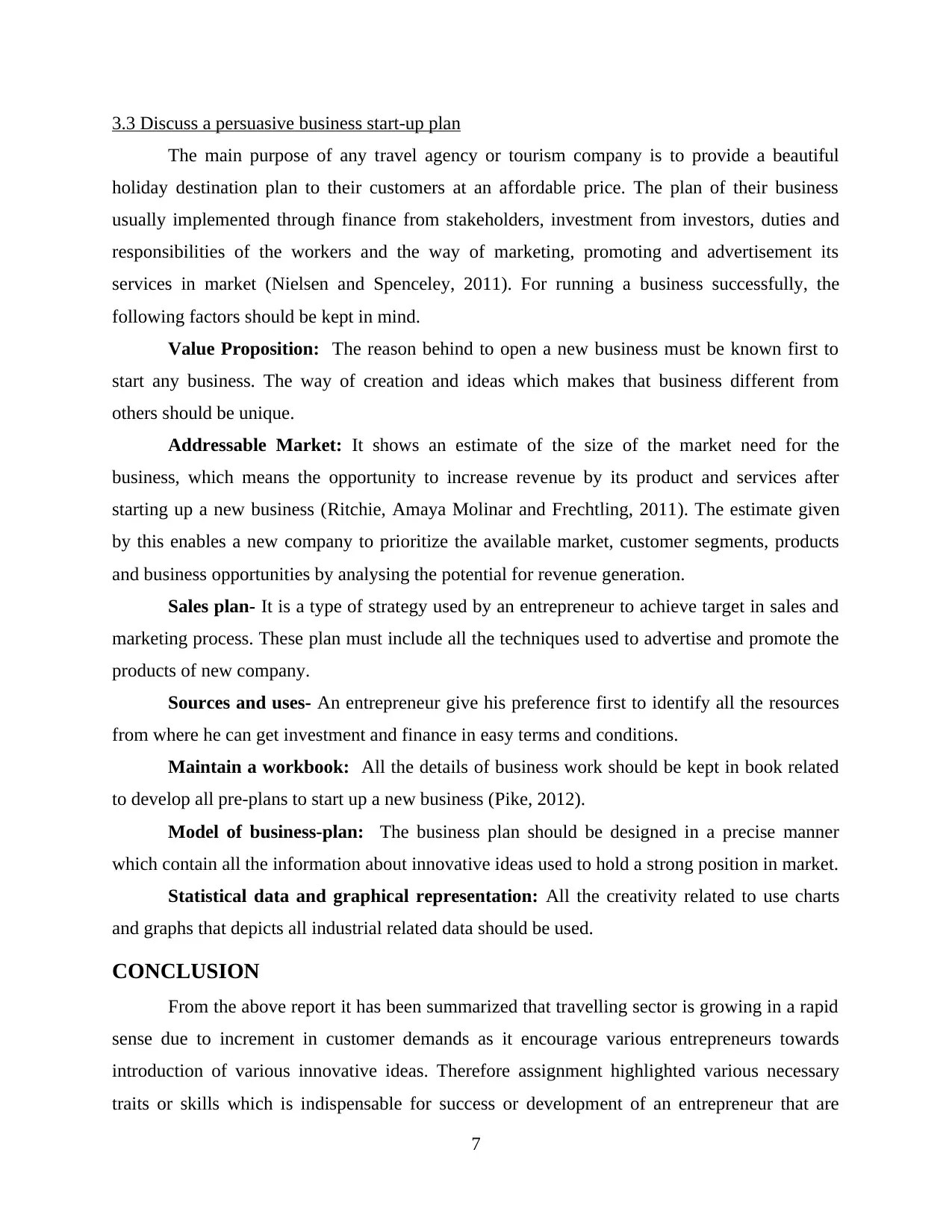
3.3 Discuss a persuasive business start-up plan
The main purpose of any travel agency or tourism company is to provide a beautiful
holiday destination plan to their customers at an affordable price. The plan of their business
usually implemented through finance from stakeholders, investment from investors, duties and
responsibilities of the workers and the way of marketing, promoting and advertisement its
services in market (Nielsen and Spenceley, 2011). For running a business successfully, the
following factors should be kept in mind.
Value Proposition: The reason behind to open a new business must be known first to
start any business. The way of creation and ideas which makes that business different from
others should be unique.
Addressable Market: It shows an estimate of the size of the market need for the
business, which means the opportunity to increase revenue by its product and services after
starting up a new business (Ritchie, Amaya Molinar and Frechtling, 2011). The estimate given
by this enables a new company to prioritize the available market, customer segments, products
and business opportunities by analysing the potential for revenue generation.
Sales plan- It is a type of strategy used by an entrepreneur to achieve target in sales and
marketing process. These plan must include all the techniques used to advertise and promote the
products of new company.
Sources and uses- An entrepreneur give his preference first to identify all the resources
from where he can get investment and finance in easy terms and conditions.
Maintain a workbook: All the details of business work should be kept in book related
to develop all pre-plans to start up a new business (Pike, 2012).
Model of business-plan: The business plan should be designed in a precise manner
which contain all the information about innovative ideas used to hold a strong position in market.
Statistical data and graphical representation: All the creativity related to use charts
and graphs that depicts all industrial related data should be used.
CONCLUSION
From the above report it has been summarized that travelling sector is growing in a rapid
sense due to increment in customer demands as it encourage various entrepreneurs towards
introduction of various innovative ideas. Therefore assignment highlighted various necessary
traits or skills which is indispensable for success or development of an entrepreneur that are
7
The main purpose of any travel agency or tourism company is to provide a beautiful
holiday destination plan to their customers at an affordable price. The plan of their business
usually implemented through finance from stakeholders, investment from investors, duties and
responsibilities of the workers and the way of marketing, promoting and advertisement its
services in market (Nielsen and Spenceley, 2011). For running a business successfully, the
following factors should be kept in mind.
Value Proposition: The reason behind to open a new business must be known first to
start any business. The way of creation and ideas which makes that business different from
others should be unique.
Addressable Market: It shows an estimate of the size of the market need for the
business, which means the opportunity to increase revenue by its product and services after
starting up a new business (Ritchie, Amaya Molinar and Frechtling, 2011). The estimate given
by this enables a new company to prioritize the available market, customer segments, products
and business opportunities by analysing the potential for revenue generation.
Sales plan- It is a type of strategy used by an entrepreneur to achieve target in sales and
marketing process. These plan must include all the techniques used to advertise and promote the
products of new company.
Sources and uses- An entrepreneur give his preference first to identify all the resources
from where he can get investment and finance in easy terms and conditions.
Maintain a workbook: All the details of business work should be kept in book related
to develop all pre-plans to start up a new business (Pike, 2012).
Model of business-plan: The business plan should be designed in a precise manner
which contain all the information about innovative ideas used to hold a strong position in market.
Statistical data and graphical representation: All the creativity related to use charts
and graphs that depicts all industrial related data should be used.
CONCLUSION
From the above report it has been summarized that travelling sector is growing in a rapid
sense due to increment in customer demands as it encourage various entrepreneurs towards
introduction of various innovative ideas. Therefore assignment highlighted various necessary
traits or skills which is indispensable for success or development of an entrepreneur that are
7
Paraphrase This Document
Need a fresh take? Get an instant paraphrase of this document with our AI Paraphraser
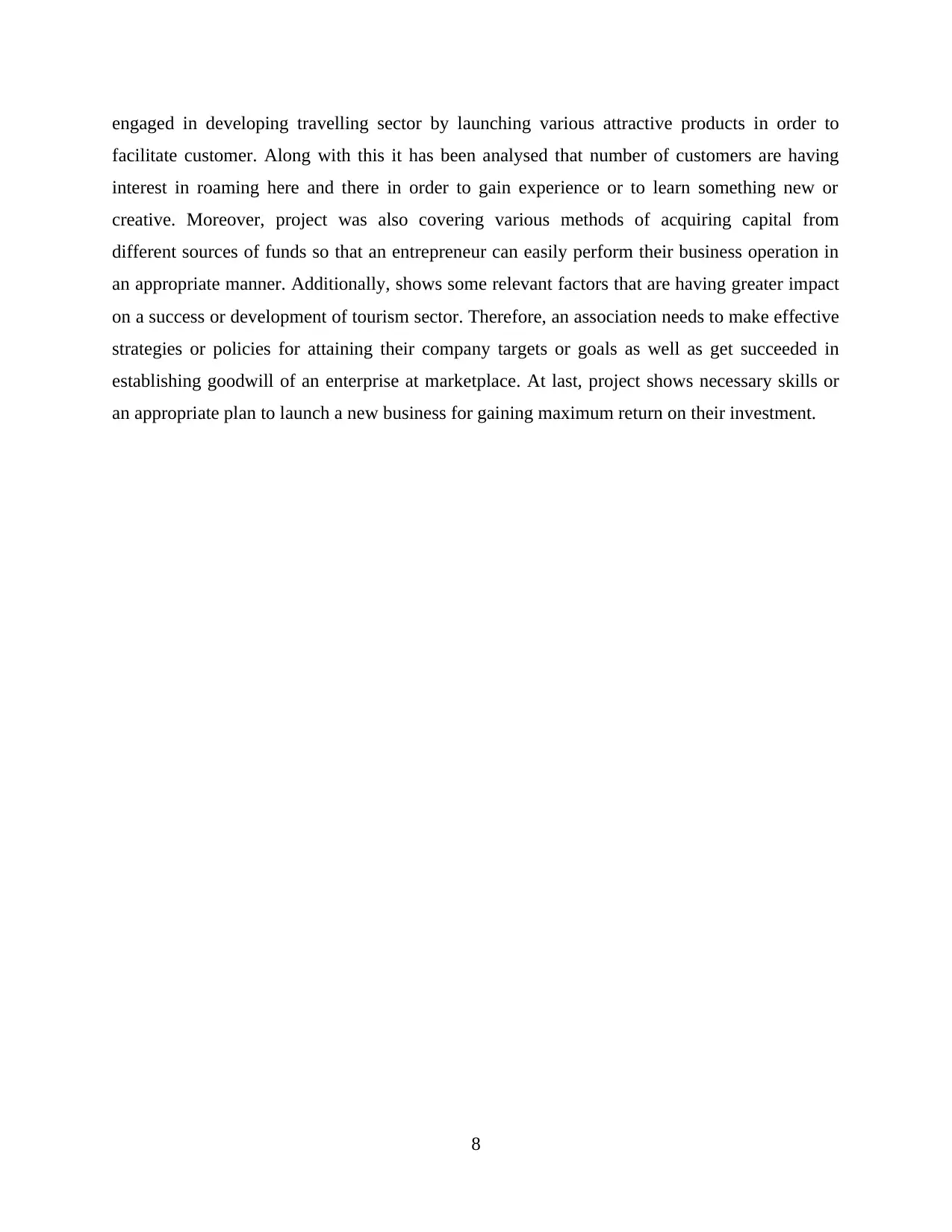
engaged in developing travelling sector by launching various attractive products in order to
facilitate customer. Along with this it has been analysed that number of customers are having
interest in roaming here and there in order to gain experience or to learn something new or
creative. Moreover, project was also covering various methods of acquiring capital from
different sources of funds so that an entrepreneur can easily perform their business operation in
an appropriate manner. Additionally, shows some relevant factors that are having greater impact
on a success or development of tourism sector. Therefore, an association needs to make effective
strategies or policies for attaining their company targets or goals as well as get succeeded in
establishing goodwill of an enterprise at marketplace. At last, project shows necessary skills or
an appropriate plan to launch a new business for gaining maximum return on their investment.
8
facilitate customer. Along with this it has been analysed that number of customers are having
interest in roaming here and there in order to gain experience or to learn something new or
creative. Moreover, project was also covering various methods of acquiring capital from
different sources of funds so that an entrepreneur can easily perform their business operation in
an appropriate manner. Additionally, shows some relevant factors that are having greater impact
on a success or development of tourism sector. Therefore, an association needs to make effective
strategies or policies for attaining their company targets or goals as well as get succeeded in
establishing goodwill of an enterprise at marketplace. At last, project shows necessary skills or
an appropriate plan to launch a new business for gaining maximum return on their investment.
8
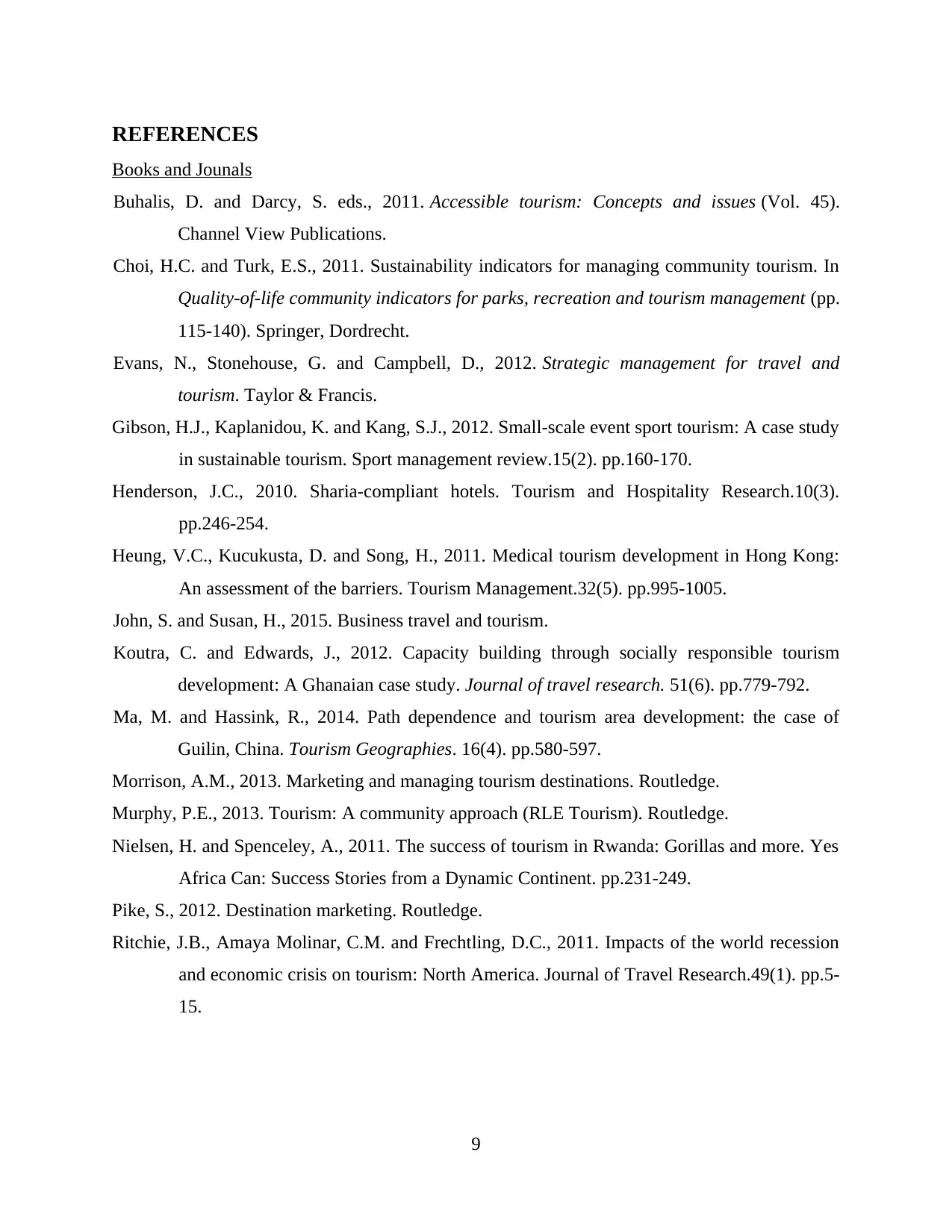
REFERENCES
Books and Jounals
Buhalis, D. and Darcy, S. eds., 2011. Accessible tourism: Concepts and issues (Vol. 45).
Channel View Publications.
Choi, H.C. and Turk, E.S., 2011. Sustainability indicators for managing community tourism. In
Quality-of-life community indicators for parks, recreation and tourism management (pp.
115-140). Springer, Dordrecht.
Evans, N., Stonehouse, G. and Campbell, D., 2012. Strategic management for travel and
tourism. Taylor & Francis.
Gibson, H.J., Kaplanidou, K. and Kang, S.J., 2012. Small-scale event sport tourism: A case study
in sustainable tourism. Sport management review.15(2). pp.160-170.
Henderson, J.C., 2010. Sharia-compliant hotels. Tourism and Hospitality Research.10(3).
pp.246-254.
Heung, V.C., Kucukusta, D. and Song, H., 2011. Medical tourism development in Hong Kong:
An assessment of the barriers. Tourism Management.32(5). pp.995-1005.
John, S. and Susan, H., 2015. Business travel and tourism.
Koutra, C. and Edwards, J., 2012. Capacity building through socially responsible tourism
development: A Ghanaian case study. Journal of travel research. 51(6). pp.779-792.
Ma, M. and Hassink, R., 2014. Path dependence and tourism area development: the case of
Guilin, China. Tourism Geographies. 16(4). pp.580-597.
Morrison, A.M., 2013. Marketing and managing tourism destinations. Routledge.
Murphy, P.E., 2013. Tourism: A community approach (RLE Tourism). Routledge.
Nielsen, H. and Spenceley, A., 2011. The success of tourism in Rwanda: Gorillas and more. Yes
Africa Can: Success Stories from a Dynamic Continent. pp.231-249.
Pike, S., 2012. Destination marketing. Routledge.
Ritchie, J.B., Amaya Molinar, C.M. and Frechtling, D.C., 2011. Impacts of the world recession
and economic crisis on tourism: North America. Journal of Travel Research.49(1). pp.5-
15.
9
Books and Jounals
Buhalis, D. and Darcy, S. eds., 2011. Accessible tourism: Concepts and issues (Vol. 45).
Channel View Publications.
Choi, H.C. and Turk, E.S., 2011. Sustainability indicators for managing community tourism. In
Quality-of-life community indicators for parks, recreation and tourism management (pp.
115-140). Springer, Dordrecht.
Evans, N., Stonehouse, G. and Campbell, D., 2012. Strategic management for travel and
tourism. Taylor & Francis.
Gibson, H.J., Kaplanidou, K. and Kang, S.J., 2012. Small-scale event sport tourism: A case study
in sustainable tourism. Sport management review.15(2). pp.160-170.
Henderson, J.C., 2010. Sharia-compliant hotels. Tourism and Hospitality Research.10(3).
pp.246-254.
Heung, V.C., Kucukusta, D. and Song, H., 2011. Medical tourism development in Hong Kong:
An assessment of the barriers. Tourism Management.32(5). pp.995-1005.
John, S. and Susan, H., 2015. Business travel and tourism.
Koutra, C. and Edwards, J., 2012. Capacity building through socially responsible tourism
development: A Ghanaian case study. Journal of travel research. 51(6). pp.779-792.
Ma, M. and Hassink, R., 2014. Path dependence and tourism area development: the case of
Guilin, China. Tourism Geographies. 16(4). pp.580-597.
Morrison, A.M., 2013. Marketing and managing tourism destinations. Routledge.
Murphy, P.E., 2013. Tourism: A community approach (RLE Tourism). Routledge.
Nielsen, H. and Spenceley, A., 2011. The success of tourism in Rwanda: Gorillas and more. Yes
Africa Can: Success Stories from a Dynamic Continent. pp.231-249.
Pike, S., 2012. Destination marketing. Routledge.
Ritchie, J.B., Amaya Molinar, C.M. and Frechtling, D.C., 2011. Impacts of the world recession
and economic crisis on tourism: North America. Journal of Travel Research.49(1). pp.5-
15.
9
⊘ This is a preview!⊘
Do you want full access?
Subscribe today to unlock all pages.

Trusted by 1+ million students worldwide
1 out of 12
Related Documents
Your All-in-One AI-Powered Toolkit for Academic Success.
+13062052269
info@desklib.com
Available 24*7 on WhatsApp / Email
![[object Object]](/_next/static/media/star-bottom.7253800d.svg)
Unlock your academic potential
Copyright © 2020–2026 A2Z Services. All Rights Reserved. Developed and managed by ZUCOL.




